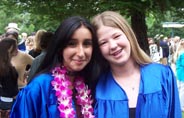
Search
| Mentorship Manual | : | Workshops | : | Afterschool Mentoring | : | Tag Along | : | Research | : | Volunteering | : | Events | : | Donate |
 |

|
|
Art of MedicineHumanities and the Arts in the Service of Relationship-Centered CareJohanna Shapiro, Ph.D.; Professor, Department of Family Medicine; Director, Program in Medical Humanities & Arts, University of California Irvine, School of Medicine Forward-looking training in medicine and the health professions recognizes that the goal of clinical practice should be relationship-centered care (1), a kind of care that emphasizes the mutuality and reciprocity of the interaction between doctor and patient; the importance of the personhood of both physician and patient; the capacity to both recognize and skillfully work with emotions and affect in the doctor-patient encounter; and the recognition that the practice of medicine is always a moral enterprise. In order to achieve relationship-centered care, the medical student or health professional student must learn to cultivate self-awareness and mindfulness (2). Knowing oneself enables physicians to be trustworthy judges of their own responses, thoughts, and emotions. This self-knowledge in turn helps them to more genuinely empathize with their patients. It also frees up practitioners to be fully present, in a clear-sighted, nonjudgmental way that avoids preconceived ideas about patients, in order to determine altruistic and compassionate courses of action that meet their patients needs and circumstances (3). There are many ways for health professional trainees to learn to question and develop critical distance from their educational experiences. Many medical schools now offer opportunities for students to incorporate the arts and humanities, such as personal essays and poetry, painting, drawing, theater, even dance and music, as ways of reflecting on their interactions with patients and supervisors, and their experience of becoming doctors (4). Art and literature require both emotional engagement and intellectual analysis, so they are useful ways of involving the whole person of the learner (5). Because they emphasize self-expression and personal perspective, they tend to provide intimate windows into their creators’ lives. We have included examples of students’ original creative work on this website to provide insights into the educational experience of medical students and to share their perceptions about what it means to become a doctor. 1. Beach MC, Inui T, Frankel R, et al. Relationship-centered care: a constructive reframing. J Gen Intern Med 2006;21:53-58.
|
|
|
|
The Center for Future Health Professionals University of California, Irvine Health Affairs Behnoosh Afghani, MD © 2007 The Regents of the University of California. All Rights Reserved. Last Updated: May 04, 2011
Comments & Questions:
Privacy & Legal Notice |

|
